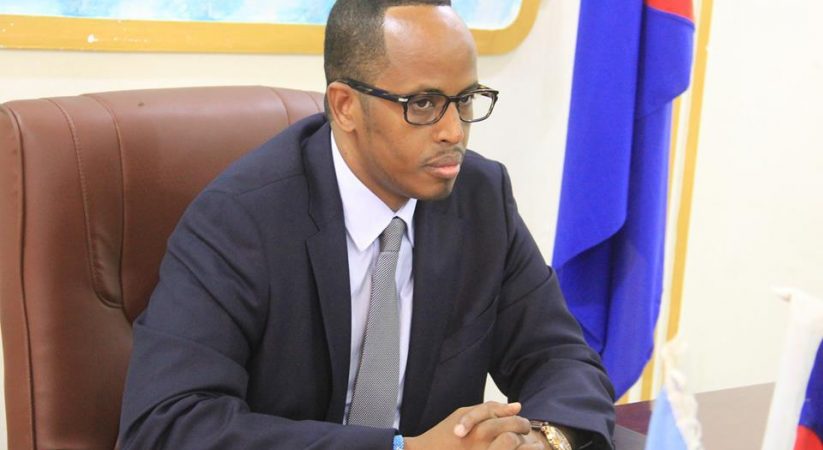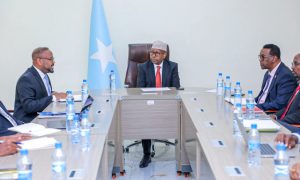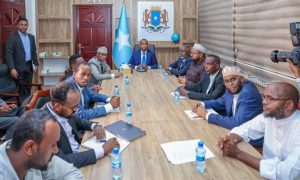
by Heikal I. Kenneded | January 29, 2018 – With the latest revelations on last week that the young and dynamic mayor of Mogadishu, Thabit Abdi lost his job because he became an ardent advocate of the capital, Mogadishu becoming another regional state, hoping to achieve for the capital city an equal status to other regional states and eventually become its president in order to enjoy a greater degree of autonomy. In this light, most people are asking themselves the good question: “Whether Mogadishu should become one of the Federal Member States?” But to understand the core problem of rushing to such new state formation, here it’s instructive to remember how problematic it could be of creating a parallel government. There are obvious reasons for not allowing Mogadishu to become part of the Federated States, especially its important location as the seat of the Central Federal Government. If the capital city were to become another regional state, the members of the central government would be unduly beholden to it. In other words, creating a parallel regional state in the capital would reign in the proceedings of the central government to get their way, simply by virtue of physical proximity to Villa Somalia.
Emboldened by his relative popularity, the mayor is allegedly suspected of stirring up the city’s residents to form Benadir regional state of equal status of other regional states in the country. It’s a real political tragedy that the unrivaled ambition of the mayor who presented himself as a progressive reformist came to such an abrupt end, simply because he couldn’t be in step with the same administration that nominated to the post, in the first place. Despite the grave security challenges facing the capital city, not to mention the necessity to provide access to public education for the hundreds of thousands of children, instead the mayor to choose the formation of a regional state shows lack of political maturity and innovation. In political science, political immaturity is defined as the inability of politicians to differentiate between the season for politicking and when to concentrate on governance, which is none but basically improving the welfare of the average masses.
Some may say, mayor Thabit might have been used by other political disruptors whose main intentions were to create another distraction for the fledging government led President Farmajo, likewise on how proponents of the Jubaland state created unnecessary diversion for President Hassan Sheikh’s first year in office. Perhaps it is, but I also see it as a sign that as Somalis, we are unable to come up with political ideals and are lacking in political maturity as a society. It also appears that quite a lot of those sponsoring the formation of a Benadir regional state are splinter groups of opposition groups; mainly formed by disgruntled members of the parliament — more often than not – lost in becoming ministers. In the end, mayor Thabit should have been focused in securing the capital’s security apparatus and rebuilding the city’s debilitating infrastructure, instead of waging a political war. In a political war that could have set back the country’s future.
In a country like Somalia where there are deep divisions among its different clans, the seat of the central government should be located in a neutral state, where no single clan has superior sway over other residents in the capital city. Mogadishu is home to at least 3 million residents of every clan and background and thus negates the proprietorship of a single clan or people over others. In other words, I would foresee Mogadishu’s political status as like Washington DC, where residents of the capital have no voting representation in Congress and the federal government maintains jurisdiction over the city, as well as a say in Constitutional Amendments and the right to home rule. Thus, the lack of statehood for the capital should be clearly enshrined in the country’s Constitution. The most urgent task now falls on the country’s central parliament to amend the laws governing the capital city’s legal entity. Furthermore, it is worth noting that the Somali provisional constitution that was adopted on August 1, 2012 by a National Constitutional Assembly in Mogadishu, stipulates that two or more regions may voluntarily merge to form a federal member state.
The alternative, which means the creation of a dual sovereignty and parallel government made up of local and federal government that will only increase the political chaos that hampered the country’s evolution into a stable federal government. Unfortunately, much of the political disrupters are reluctant to accept such neutrality of the political status of the capital city and advocating the capital city to have a regional state stature. Nevertheless, due to the current political dispensation in Mogadishu towards regional state is not the result of a natural process, but rather the predominant clans in the capital and its surroundings’ competition for political power.
Similar dynamics were recently evident in the challenges from other heads of federal regional states with the central government in regards of foreign affairs and other relevant bilateral negotiations. While a federal government is a system that divides up power between a strong national government and smaller local governments, it seems strange nowadays when we’re thoroughly accustomed the opposite. There should therefore be legal sanctions against such usurpation of power. For instance, the federal government should have jurisdiction over regional states in all matters concerning national interest. In other words, unlike centralized forms of governments, federalism is a hierarchical system of government in which two levels of government administer a variety of control over the same geographic area and that’s where the trepidations of federalism lie.
Some warnings are in order, federalism is a very messy form of government and Somalia did not choose this path on its own accord but rather imposed upon by unhelpful key international players, which neither had in mind the political stability nor the promotion of democracy and peace in the country. Unfortunately, it’s too late to turn the clock back, but the current leadership is on the right track of reaching comprise with the Federal Member States in regards of resource-sharing, power-sharing and political representation, until a strong central government is being established. What’s striking is how many crooked politicians and greedy clan elders are trying to take advantage of this fragile state of the country to promote disunity and fragmentation in the federal political system, however, the Central Government should not tolerate it for the sake of the country not perishing from the face of the earth.
.
.
Heikal I. Kenneded
Washington D.C.
heikalk@yahoo.com
.
.
.
Xafiiska Wararka Qaranimo Online | Muqdisho
____________________________________________________
_____________________________________________________________________________________
Xafiiska Wararka Qaranimo Online | Mogadishu, Somalia
_____________________________________________________________________________________Advertisement
_____________________________________________________________________________________







